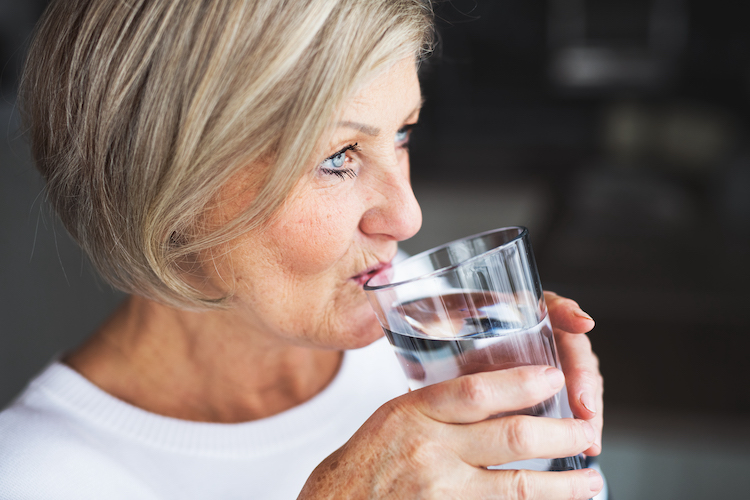It can be challenging to ensure that you or your loved one is staying hydrated in the winter. A common belief is that people become dehydrated primarily in the summer. However, the winter months affect our bodies just as much, if not more so. We also tend to drink less water once the colder months hit because we simply don’t feel as thirsty. This can be especially problematic for seniors, as they already experience a diminished sense of thirst.
Because older adults are not always aware that they are becoming dehydrated, it’s important to establish self-care routines focusing on hydration. By drinking water on a schedule, incorporating foods high in water content into their diets, and using a humidifier, older adults can reduce their chances of becoming dehydrated during the winter. Keep reading to find out how dehydration affects the body and for six hydration tips for seniors.
How Dry Air Affects a Person’s Body
Humidity levels naturally drop during cold weather months. Ideal levels of humidity during the winter should stay around 45%. When they fall, your loved one may notice the following:
- Their Nasal Passages Become Uncomfortable: Your elderly relative might notice that their nose has become itchy and irritated. They might experience nosebleeds, as well.
- Their Skin Becomes Dry: During the winter, skin may become itchy, flaky, and tight around the joints. It might even crack or chap. If an elderly adult has eczema and acne, they may notice these conditions flare up.
- Their Eyes Will Feel Much Drier: Older adults might find they rub their eyes more during the winter due to the dry air.
Recognize the Signs of Dehydration in Seniors
Because seniors are at greater risk of dehydration, it’s important to familiarize yourself with the symptoms of dehydration. When you can do this, you will know when to offer your loved one more water or when to reach out to their doctor or a healthcare professional for assistance.
Signs of mild dehydration in seniors include:
- Dark-colored urine
- Not urinating often
- Headaches
- Dry mouth
- Sleepiness
- Tiredness
- Dizziness or light-headedness
If your loved one is experiencing any of the following symptoms, seek assistance from a healthcare professional right away:
- Diarrhea or vomiting that lasts longer than 24 hours
- Irritability or disorientation
- Inability to keep fluids down
- Black or bloody stool
Tips for Improving Hydration in Seniors
To avoid dehydration during the winter, drinking plenty of fluids — primarily water — and eating moisture-rich foods is imperative. Here are some of our favorite ideas for promoting hydration in seniors:
- Drink Water: The most important hydration tip for seniors is to drink enough water! To do this, encourage your loved one to drink water on a schedule, such as drinking as soon as they get up, after each meal, and before and after exercising. Consider encouraging them to keep a refillable bottle with them at all times.
- Eat Food with High Water Content: Sometimes, we don’t feel like drinking water. That is when water-dense foods are useful. Eating fruits and vegetables like cucumbers, celery, tomatoes, watermelon, bell peppers, grapes, cantaloupe, oranges, blueberries, and apples will taste yummy and keep your loved one hydrated. Other foods that promote hydration in seniors include yogurt, soups, and jellies.
- Drink Broth: Warm drinks and food in the winter are not only great at keeping your loved ones warm, but they also help keep them hydrated. Broth, in particular, can help fend off dehydration in older adults as it is a liquid with a high water content. Plus, it tastes delicious!
- Remember to Use Moisturizer: In addition to encouraging your loved one to eat and drink their water, add moisture to their skin through lotions and moisturizers. You get bonus points when you choose a lightweight SPF, as it also protects their skin from the sun’s harmful rays.
- Set a Reminder: You may need to schedule your loved one’s water intake, as it can be hard for both of you to remember to drink water. Seniors often do not feel thirsty even when their bodies crave water, and you have a hectic schedule full of caregiver duties and parent responsibilities. For these reasons, it’s helpful to set reminders when it’s time to drink some water or eat moisture-rich foods. Are you interested in other helpful tips for keeping track of all your caregiver responsibilities? Check out the best caregiver apps for helpful ideas.
- Use a Humidifier: Winter is known for its dry air — both outside and inside the home. You can help keep your loved one’s body hydrated by using a humidifier, which keeps moisture in the air and alleviates dry skin.
Stay Hydrated & Keep Healthy at Wesley Enhanced Living
Seniors who live alone may struggle with dehydration and health concerns more than those living in a continuing care retirement community. If you are ready to enhance your loved one’s health, why not make the move today and find a skilled nursing or independent living option in the Philadelphia region that works for your loved one? The staff at Wesley Enhanced Living understands what it takes to promote hydration in seniors and can help with their every need. Contact us today to learn more about all that we have to offer!
Wesley Enhanced Living provides high-quality senior retirement communities for you or your loved ones. Contact one of our Philadelphia area locations and find out why our seniors love where they live. Our staff is happy to discuss your elder’s needs or your own and inform you of our range of services. Virtual tours are now available. Call us today for more information.

